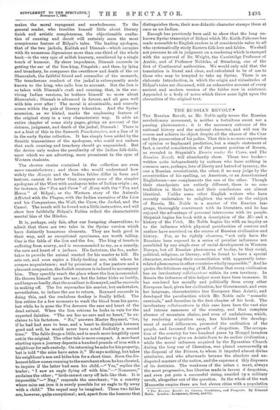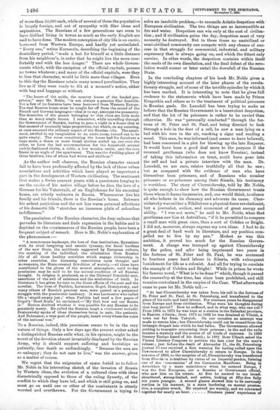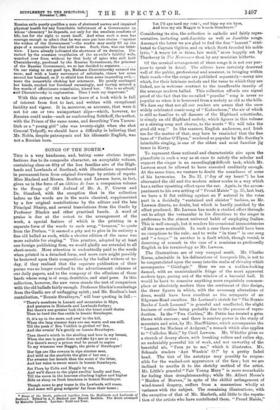THE RUSSIAN REVOLT.*
THE. Russian Revolt, as Mr. Noble aptly terms the Russian revolutionary movement, is neither a fortuitous event nor a passing phenomenon ; it is the necessary outcome of the national history and the national character, and will run its course and achieve its object despite all the ukases of the Czar and the persecution of his police. That this is no mere expression of opinion or haphazard prediction, but a simple statement of fact, a careful consideration of the present position of Russia, as revealed in Stepniak's Russia under the Czars, and The Russian. Revolt, will abundantly show. These two books— written quite independently by authors who have nothing in common save, perhaps, love of liberty and hatred of tyranny, the one a Russian revolutionist, the other, if we may judge by the eccentricities of his spelling, an American, or an Americanised Englishman—are complements the one of the other. Though their standpoints are entirely different, there is no con- tradiction in their facts, and their conclusions are almost identical. Unlike some other English writers who have recently undertaken to enlighten the world on the subject of Russia, Mr. Noble is a master of the Russian lan- guage, thoroughly conversant with its literature, and he has enjoyed the advantage of personal intercourse with its people. Stepniak begins his book with a description of the Mir and a history of the Vetch. Mr. Noble begins his with an inquiry as to the influence which physical peculiarities of contour and surface have exercised on the course of Russian civilisation and history. For, as he rightly observes, "not only have the Russians been exposed to a series of peculiar influences not paralleled by any single case of racial development in Western Europe, but all Russian phenomena of to-day, be they social, political, religious, or literary, will be found to have a special character, rendering their reconciliation with apparently inter- related phenomena in other countries wholly impossible." And he quotes the felicitous saying of M. Pelletan that every civilisation has an involuntary collaborateur within its own territory. In Russia the influence of this helper must have been immense. It has sundered her morally and politically from every other European land, given her civilisation, her Government, and even her language, characteristics less European than Asiatic, and developed the peculiarities which Mr. Noble calls " nomadic survivals," and describes in the first chapter of his book. The involuntary collaborateurs in this case have been the vast size and intense sameness of the country, and that complete absence of mountain chains, and even of undulations, which, by rendering migration easy, has hindered the develop- ment of racial differences, promoted the unification of the people, and favoured the growth of despotism. The occupa- tion of the country for two hundred years by Mongol invaders tended further to give an Asiatic form to its earlier civilisation ; while the moral influence acquired by the Byzantine Church during the long war of liberation, was placed unreservedly at the disposal of the Princes, to whom it imputed almost divine attributes, and who afterwards became the absolute and un- disputed masters of the nation, and the supreme el thly disposers of its destinies. The weakness of the urban e ment, always the most progressive, has likewise made in favout )f despotism, and even yet puts a successful rising, unaided by a military revolt, altogether out of the question. In the whole of the vast Muscovite empire there are but eleven cities with a population • The Roos.ian Revolt: its Causes, Conditions, and Prospects. By Edmund. Noble. Loudon : Longmms, Green, and Co.
of more than 50,000 each, while of several of these the population is largely foreign, and out of sympathy with Slav ideas and
aspirations. The Russians of a few generations ago seem to have disliked living in towns as much as the early English are said to have done. The modern conception of city life is an exotic,
borrowed from Western Europe, and hardly yet assimilated. " Every one," writes Karamzin, describing the beginning of the domiciliary period, " made a but for himself at a little distance from his neighbour's, in order that he might live the more com- fortably and with the less danger." There are whole Govern- ments which, with the exception of the official capitals, possess no towns whatever ; and many of the official capitals, were they to lose that character, would be little more than villages. Even to this day the Russians retain many nomad peculiarities. They live as if they were ready to flit at a moment's notice, either with bag and baggage or without.
" The house of the noble, the country house of the landed pro- prietor," says Mr. Noble, "is not always a genuine Slav domicile. Not a few of its features have been borrowed from Western Europe. The real Russian house must be sought far off from the sound of the French and German languages—that is to say, amongst the peasantry. The domiciles of the poorer belonging to this class are little more than so many single rooms. I remember, while travelling through the Government of Bemire, having to pass a night in a house that at first seemed of unusually large proportions, but which, on my entering, at once assumed the ordinary aspect of the Russian izba. The apart- ment, swelled in my imagination to an extra room, turned out to be quite empty. The room constituting the house had for furniture a huge stove, a dozen or more broad shelves nailed up, one over the other, to form the bed accommodation for the household, several rudely-fashioned chairs, a table, a low wooden settle, and the icon frame in an angle of the apartment. This was the dwelling-place of three brothers, two of whom had wives and children."
As the author well observes, the Russian character cannot fail to have been profoundly affected by the lack of those urban associations and activities which have played so important a
part in the development of Western civilisation. The sentiment that makes a Swiss peasant yearn with a passionate longing to see the smoke of his native village before he dies, the love of a German for his Vaterstadt, of an Englishman for his ancestral home, are utterly unknown in Russia. Wheresoever live his family and his friends, there is the Russian's home. Between his ardent patriotism and the not less warm personal affections of his domestic life " stretches an immense plain of colourless indifference."
The pessimism of the Russian character, the deep sadness that pervades its literature and finds expression in the habits and is depicted on the countenances of the Russian people, have been a frequent subject of remark. Here is Mr. Noble's explanation of the phenomenon :—
"A monotonous landscape, the loss of free institutions, Byzantism with its cruel lawgiving and ascetic tyranny, the fiscal burdens of the new State, the antithesis suggested by European culture, the crushing of the individual, the elimination from Russian life of all those healthy activities which engage citizenship in other countries, the harassing restrictions upon thought and movements, the State-created frivolities of society,—ell these have contributed to the gloom of the mental atmosphere, until to-day pessimism may be said to be the normal condition of all Russian thought. In religion it produced, as in the Zhivniye. Pokoiniki sect. assertions of the evil of existence and the misfortune of birth. In literature it has given its tone to the finest efforts of the poet and the novelist. The lives of Pushkin, Lermontor, Gogol, Dostoyevsky, and many others of Russia's greatest men, were passed in a perpetual struggle with the pessimistic tendency. It was Lermontor who called life a 'stupid empty jest ;' when Pushkin had read a few pages of Gogol's ' Dead Souls,' he exclaimed,—' My God, how sad our Russia is !' Herzen doubted whether it was possible for any Russian to be genuinely merry. He called the Russian laugh a ricanement moladif. Dostoyevsky spoke of ideas themselves being in pain, like patients. And Nekrassov, a true poet of the people, heard everywhere the voice of the national woe."
To a Russian, indeed, this pessimism seems to be in the very nature of things. Only a few days ago the present writer asked
a distinguished Russian exile what, in his opinion, might be the secret of the devotion almost invariably displayed by the Russian Army, why it should support suffering and hardships so patiently, face death so unflinchingly. " Because the men are so unhappy ; they do not care to live," was the answer, given as a matter of course.
We regret that the exigencies of space forbid us to follow Mr. Noble in his interesting sketch of the invasion of Russia by Western ideas, the evolution of a cultured class with ideas diametrically opposed to those of the ruling dynasty, of the conflict to which they have led, and which is still going on, and must go on until one or other of the combatants is utterly worsted and overthrown. For the Government is trying to
solve an insoluble problem,—to reconcile Asiatic despotism with • European civilisation. The two things are as incompatible as
fire and water. Despotism can win only at the cost of civilisa- tion ; and if civilisation gains the day, despotism must of very necessity be destroyed. But in these times no uncivilised or semi-civilised community can compete with any chance of suc- cess in that struggle for commercial, industrial, and military supremacy that is always going on, and which the fittest only survive. In other words, the despotism contains within itself the seeds of its own dissolution, and the final defeat of the revo- lution would sooner or later entail the downfall of the Russian State.
In the concluding chapters of his book Mr. Noble gives a highlyinteresting account of the later phases of the revolu- tionary struggle, and of some of the terrible episodes by which it has been marked. It is interesting to note that he gives full
credence to the statements which have been made by Prince Krapotkin and others as to the treatment of political prisoners in Russian gaols. Dr. Lansdell has been trying to make us believe that the Russian Government is a benevolent despotism, and that the lot of its prisoners is rather to be envied than otherwise. He was " personally conducted" through the for- tress of St. Peter and St. Paul, and being directed to look through a hole in the door of a cell, he saw a man lying on a bed with his toes in the air, smoking a cigar and reading a novel. This man, he was informed (and seems to have believed), had been concerned in a plot for blowing up the late Emperor. It would have been a good deal more to the purpose if the reverend gentleman (who does not know Russian), instead
of taking this information on trust, could have gone into the cell and had a private interview with the man. Dr. Lansdell, we are sure, relates truthfully all that he saw ;
but as compared with the evidence of men who have themselves been prisoners, and of Russians who number prisoners or ex-prisoners among their friends, his testimony is worthless. The story of Chernichevsky, told by Mr. Noble, is quite enough to show how the Russian Government treats those whom it deems its enemies, and, one would think, to silence all who believe in its clemency and advocate its cause. Cher- nichevsky was neither a Nihilist nor a physical-force revolutionist, but a• journalist, author, and economist of great energy and ability. " I was not more," he said to Mr. Noble, when that gentleman saw him at Astrakhan, " if it be permitted to compare a small man with great ones, than a sort of Cobden or Bright. I did not, moreover, always express my own ideas. I had to do a great deal of hard work in literature, and my position com- pelled me to live by my pen." Modest as was this ambition, it proved too much for the Russian Govern- ment. A charge was tramped up against Chernichevsky
by the police, and after being imprisoned two years in the fortress of St. Peter and St. Paul, he was sentenced to fourteen years hard labour in Siberia, with subsequent banishment for life as a colonist. And all for trying to emulate the example of Cobden and Bright ! While in prison he wrote his famous novel," What is to be done P" which, though it passed the censorship at the time, has since been prohibited, and still
remains contraband in the empire of the Czar. What afterwards came to pass let Mr. Noble tell :—
" At last Chernichevsky was taken from his cell in the fortress of St. Peter and St. Paul, at St. Petersburg, and transferred to the place of his exile and hard labour. For nineteen years he disappeared from Europe and from civilisation. What were his thoughts daring that long period ? How be suffered, and in what way, who can tell ? From 1864 to 1871 he was kept at a station in the Zabarkal province, in Eastern t,iberia; from 1871 to 1883 he was detained at Vilnisk, a town not far from Yakutsk. On one occasion an attempt was made to rescue him ; but Chernichevsky could not be roused from the lethargic despair into which he had fallen. The Government allowed nothing to transpire concerning their prisoner ; in the end the exile became a mystery and the source of all kinds of rumours. In 1880 literary Europe heard of his death in 1881 Herr Ulbach asked the Vienna Literary Congress to petition the late Czar for the man's release ; just before the death of Alexander IL, the St. Petersburg journal Shona received a first warning for having called upon the Government to allow Chernichevsky to return to Europe. In the autumn of 1883, to the surprise of all, Chernichevsky was transferred from Billet ia to Astrakhan by virtue of an Imperial pardon, forming one of the ' concessions ' of the Coronation Manifesto. Being in Astrakhan by a mere coincidence when he entered Europe, I was the first European, not a Russian or Government official, who saw him on his return. At first he seemed to me broad- shouldered, strong-limbed, and active, looking at fifty-five fully ten years younger. A second glance showed him to be nervously restless in his manner, in a state bordering on mental prostra- tion, a complete wreck. He received me warmly, and we conversed
together for nearly an hour Nineteen years' experience of
Russian exile poorly qualifies a man of shattered nerves and impaired physical health for any formidable indictment of a Government op whose clemency' he depends, not only for the smallest comforts of life, but for the right to exert itself. And when such a man has courage enough to admit that he was once put into chains –' against the wishes of the Government '—the reader may easily fill up the gaps of a narrative like that told to me. Such, then, was our inter- view. I have already indicated the shortness of its duration. Dis- turbed by the constant trepidation of the ex-exile's faithful wife, watched over from without by that body of spies who still hold Chernichevsky, pardoned by the Russian Government, the prisoner of the Russian Government, we at last decided to separate On our rising to say good bye, Madame Chernichevsky entered the room, and with a hasty movement of solicitude, threw her arms around her husband, as if to shield him from some impending evil,— tears the meanwhile choking her utterance. He gently unclasped her hands, stroked her forehead caressingly, and having uttered a few words of affectionate consolation, kissed her. ' She is so afraid,' maid Chernichevsky in explanation. Then I took my departure."
With this extract we take our leave of a book which is full of interest from first to last, and written with exceptional lucidity and vigour. It is, moreover, so accurate, that were it not for one or two unimportant slips—which, however, no Russian could make—such as confounding Soltikoff, the author, with the Prince of the same name, and describing Vera Yasson- litch as a "young girl" (she was twenty-eight when she shot 'General TriSpoff), we should have a difficulty in believing that Mr. Noble, despite patronymic and his idiomatic English, was not a Russian born.
















































 Previous page
Previous page